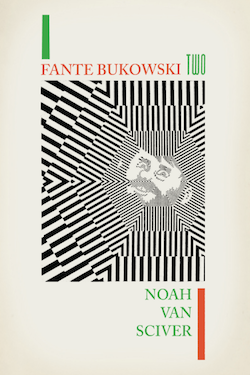Thursday Comics Hangover: The dream of the 90s is (barely) alive in Fante Bukowski
In the 1990s, a ton of male cartoonists made their careers by writing stories about schlubby men with huge egos. These self-important losers — from Buddy Bradley to Adrian Tomine's protagonists to Ivan Brunetti's self-portrayal — were important at the time: they poked necessary holes in the idea that the only stories worth telling were stories about straight white men of a certain age.

Cartoonist Noah Van Sciver's newest book, Fante Bukowski Two, seems to desperately want to be from the 1990s. It's designed to look like the Black Sparrow edition of Charles Bukowski's Factotum, and it has a completely realistic facsimile of a Borders price sticker on the back cover.
And the content of the book, too, feels ripped from the 1990s. It's a book about a bearded loser who believes himself to be the next Outlaw American Novelist, but who is in fact a talentless hack. Bukowski drinks too much, he lives on donations from his too-tolerant parents, he refuses to get a job. In this book, he lives in a flophouse and makes tons of zines and fails to sell copies all around town.
But the question that Van Sciver fails to answer is: who is this book for? Do we really need another book that skewers bloviating mediocre literary white men? Bukowski feels from the start like the alternative comics from the 1990s, and it never really stops wallowing in nostalgia for that era.
To be fair, Van Sciver is a talented cartoonist, and he has a great sense of comic timing. Parts of Fante Bukowski 2 are very funny. But I expect more than “funny” from a Fantagraphics title — the Seattle publisher has such a stellar publication history that I expect some sort of a point from all their books. Unfortunately, Bukowski feels like an exquisitely crafted fan fiction tribute to Fantagraphics titles from a bygone era.
And this question might seem petty, but it’s actually quite important: Do people like the person this book is supposedly satirizing even exist anymore? Do Bukowski acolytes still talk about the authentic human experience and produce zines to distribute at open mic nights? To me, this feels like a time-capsule, a skewering that arrives twenty years too late.
This is not to say that Van Sciver shouldn’t satirize white men, or that white men aren’t a relevant target anymore; quite the contrary. We live in a time in which mobs of bored white dudes are starting riots because their preferred flavor of corn syrup isn’t available at their local McDonald’s. If the self-entitled jackass star of Bukowski were alive today, his obsessions and behavior would likely be very different. With its obsessive backwards stare, Bukowski feels stale and hopelessly retro.